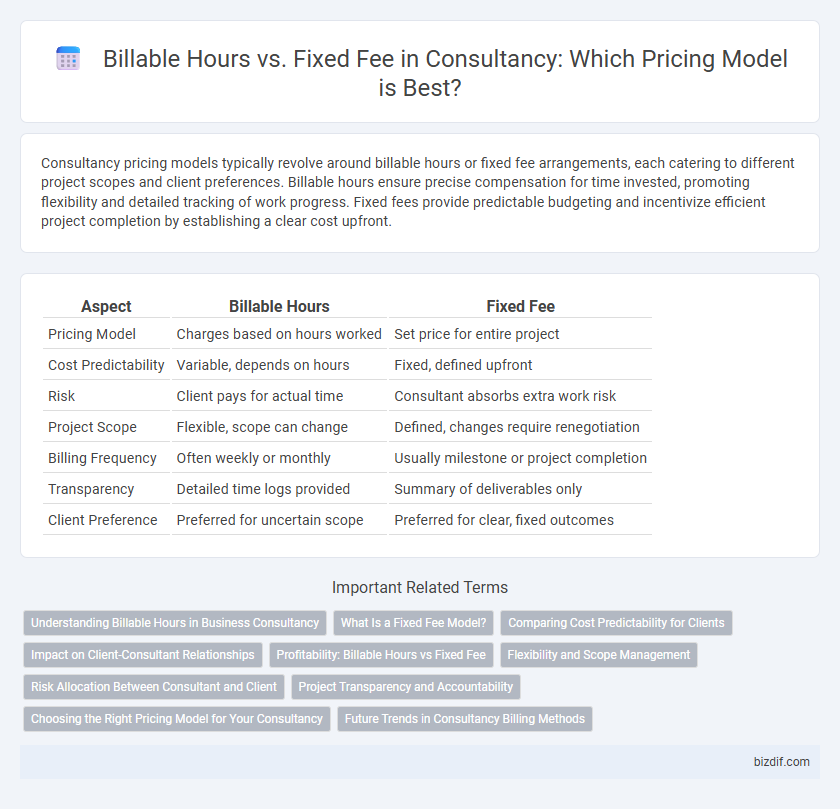Consultancy pricing models typically revolve around billable hours or fixed fee arrangements, each catering to different project scopes and client preferences. Billable hours ensure precise compensation for time invested, promoting flexibility and detailed tracking of work progress. Fixed fees provide predictable budgeting and incentivize efficient project completion by establishing a clear cost upfront.
Table of Comparison
| Aspect | Billable Hours | Fixed Fee |
|---|---|---|
| Pricing Model | Charges based on hours worked | Set price for entire project |
| Cost Predictability | Variable, depends on hours | Fixed, defined upfront |
| Risk | Client pays for actual time | Consultant absorbs extra work risk |
| Project Scope | Flexible, scope can change | Defined, changes require renegotiation |
| Billing Frequency | Often weekly or monthly | Usually milestone or project completion |
| Transparency | Detailed time logs provided | Summary of deliverables only |
| Client Preference | Preferred for uncertain scope | Preferred for clear, fixed outcomes |
Understanding Billable Hours in Business Consultancy
Billable hours represent the actual time consultants spend working on client projects, directly correlating effort with revenue generation. Tracking billable hours ensures accurate client invoicing and helps measure productivity in business consultancy settings. Understanding the nuances of billable hours enables firms to optimize resource allocation and maintain transparent client relationships.
What Is a Fixed Fee Model?
A fixed fee model in consultancy involves charging a predetermined amount for a project or service regardless of the hours worked. This pricing structure offers clients budget predictability and reduces the risk of escalating costs. Consultants benefit from streamlined project management and can focus on delivering value without tracking billable hours continuously.
Comparing Cost Predictability for Clients
Billable hours offer less cost predictability as clients are charged based on the actual time consultants spend, which can vary significantly throughout the project. Fixed fee agreements provide clients with a clear budget upfront, minimizing financial surprises and enabling better financial planning. Choosing between billable hours and fixed fees depends on the client's preference for flexibility versus cost certainty.
Impact on Client-Consultant Relationships
Billable hours provide transparency by linking consultant compensation directly to time spent, fostering trust through measurable effort but potentially causing client concerns about escalating costs. Fixed fees offer cost predictability, encouraging a focus on outcomes rather than time, which can strengthen collaboration but may lead to scope limitations or risk aversion. Balancing these models influences communication dynamics, project flexibility, and long-term client satisfaction in consultancy engagements.
Profitability: Billable Hours vs Fixed Fee
Consultancy firms maximize profitability by carefully choosing between billable hours and fixed fee pricing models. Billable hours ensure revenue directly correlates with time spent, offering flexibility for unpredictable project scopes, while fixed fees provide predictable income and incentivize efficiency but risk underestimating project complexity. Analyzing historical project data and resource allocation helps consultants balance risk and reward, optimizing profit margins by aligning pricing strategies with client needs and project deliverables.
Flexibility and Scope Management
Billable hours offer flexibility by allowing consultants to charge based on actual time spent, accommodating evolving project scopes and client needs. Fixed fee arrangements provide clear cost expectations but require precise scope definition to prevent scope creep and ensure profitability. Effective scope management balances client flexibility with project control, optimizing resource allocation and minimizing risk.
Risk Allocation Between Consultant and Client
Billable hours shift financial risk toward the client, as costs can escalate with project duration and scope changes, requiring meticulous tracking and approval. Fixed fee engagements transfer risk to the consultant, who must deliver agreed-upon outcomes within a set budget regardless of unforeseen challenges, incentivizing efficient resource management. Clear contractual terms and scope definitions are essential to balance risk allocation and prevent disputes in consultancy agreements.
Project Transparency and Accountability
Billable hours provide granular tracking of time spent, enhancing project transparency by allowing clients to see detailed work logs and resource allocation. Fixed fees promote accountability through clear budget caps and predefined deliverables, minimizing scope creep and financial surprises. Combining both approaches ensures transparent communication and mutual accountability throughout the consultancy engagement.
Choosing the Right Pricing Model for Your Consultancy
Selecting the appropriate pricing model for your consultancy depends on project complexity and client preferences. Billable hours suit projects with variable scopes, ensuring compensation for all time spent, while fixed fees offer predictable costs for well-defined deliverables. Analyzing past project data and client budgets helps determine whether flexibility or certainty will maximize profitability and client satisfaction.
Future Trends in Consultancy Billing Methods
Future trends in consultancy billing methods indicate a growing shift from traditional billable hours to fixed fee arrangements, driven by client demand for cost predictability and value-based pricing models. Advanced data analytics and AI tools are enabling consultants to more accurately estimate project scopes and deliverables, enhancing the feasibility of fixed fees. Hybrid billing models that combine elements of both approaches are emerging, offering flexibility and aligning incentives for both consultants and clients in an evolving consultancy landscape.
Billable Hours vs Fixed Fee Infographic

 bizdif.com
bizdif.com